Introduction & Background
In September 2015, following a historic and extensive negotiation and consultation process, the 193 Member States of the United Nations (UN) adopted the 2030 Agenda for Sustainable Development (the 2030 Agenda)1 to guide development efforts around the world. A global 15-year plan of action to end poverty, protect the planet and ensure prosperity for all, while strengthening universal peace, the 2030 Agenda includes an ambitious set of 17 Sustainable Development Goals (SDGs) and 169 targets. It also contains the central and transformative pledge that “no one will be left behind” and the “endeavor to reach the furthest behind first.”2 Focused on the economic, social and environmental dimensions of sustainable development, the 2030 Agenda is universal in its nature, with the SDGs applicable to all countries – developed and developing alike – regardless of their level of development.
Building upon its predecessor, the Millennium Development Goals (MDGs), the SDGs address a number of important issues not previously covered by the MDGs. Most notably, the inclusion of a stand-alone goal focused on fostering peaceful, just and inclusive societies is considered by many to be a groundbreaking achievement within the new development framework. The existence of SDG 16, which seeks to “promote peaceful and inclusive societies for sustainable development, provide access to justice for all and build effective, accountable and inclusive institutions at all levels”3 was the result of hard-fought efforts by Member States, civil society and other key stakeholders for formal recognition of the importance of democratic governance, peace and security, and the rule of law – including the protection of human rights – to sustainable development.4
The 2030 Agenda and its commitment to peaceful, just and inclusive societies is complemented by several other global development agreements including the Paris Agreement on Climate Change5, the Sendai Framework on Disaster Risk Reduction6, the New Urban Agenda7 and the Addis Ababa Action Agenda8, the latter which provides a global framework for financing sustainable development.
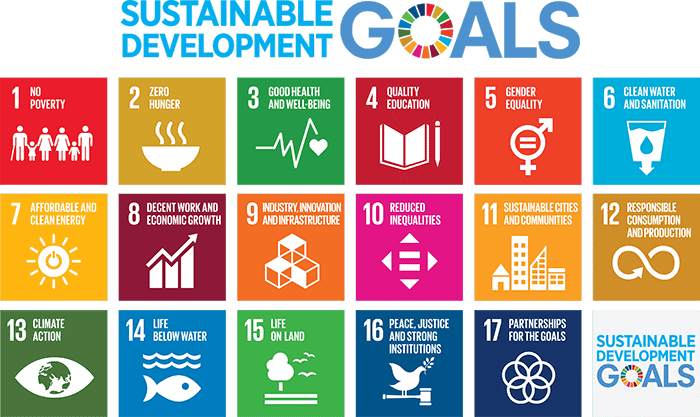
As part of the 2030 Agenda, SDG 16 aims to “promote peaceful and inclusive societies for sustainable development, provide access to justice for all and build effective, accountable and inclusive institutions at all levels.”9 It encompasses 12 targets10 and 24 global indicators covering a range of issues related to peaceful, just and inclusive societies, including violence, violence against children, the rule of law, access to justice, illicit financial and arms flows, stolen assets, organized crime, corruption and bribery, effective, accountable and transparent institutions, responsive, inclusive, participatory and representative decision-making, global governance, legal identity, access to information, fundamental freedoms, institutional capacity-building and non-discriminatory laws and policies. 11
While SDG 16 is the main Goal for fostering “peaceful, just and inclusive societies which are free from fear and violence,”12
the Pathfinders for Peaceful, Just and Inclusive Societies13 have identified 24 targets from seven other Goals – including SDGs 1, 4, 5, 8, 10, 11 and 17 – that directly measure an aspect of peace, inclusion or access to justice. These additional 24 targets together with the 12 targets from SDG 16 are collectively known as ‘SDG16+.’14Accordingly, SDG16+ encompasses a total of 36 targets from across the SDGs that directly contribute to building more peaceful, just and inclusive societies. As a framework, the SDG16+ targets provide a more comprehensive picture of the actions that are needed to realize peace, inclusion and justice for all, especially for those furthest behind.
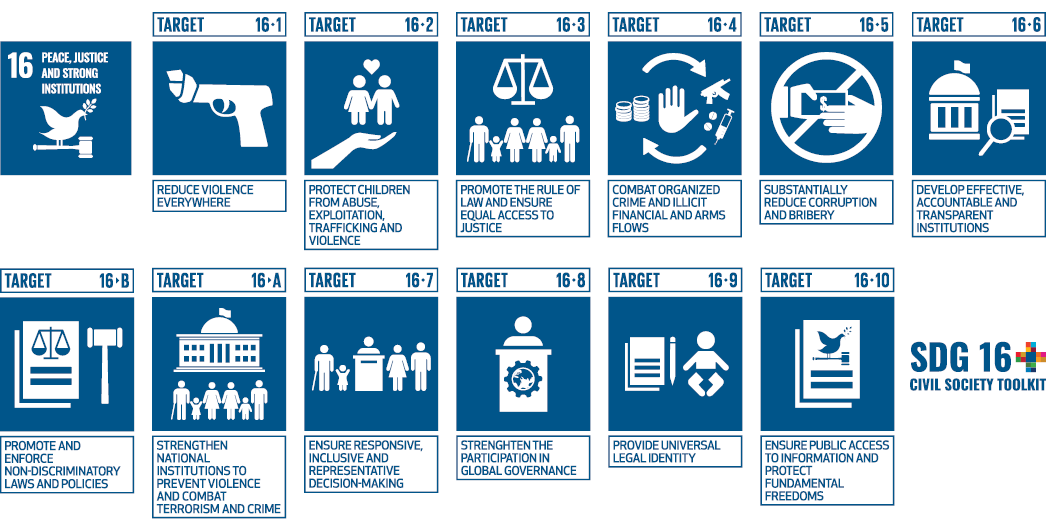

The 2030 Agenda recognizes that “there can be no sustainable development without peace and no peace without sustainable development.”15 Peaceful, just and inclusive societies are accordingly considered both outcomes and enablers of sustainable development.
In relation to outcomes, SDG16+ targets address critically important issues – such as violence, insecurity, conflict, injustice, exclusion, inequality, discrimination, weak institutions and poor governance – that negatively affect the daily lives of people around the world and undermine their ability to achieve sustainable development. SDG16+ provides a human rights-based framework to address issues that are relevant and matter to all citizens and people in all countries. Notably, it addresses “patterns of exclusion, structural and institutional constraints and unequal power relations that produce and reproduce patterns of exclusion, marginalization, inequality and suffering over generations.”16 In short, SDG16+ targets are important objectives to achieve in and of themselves, especially for the most vulnerable and marginalized groups.
As an enabler, SDG16+ provides the foundations needed for the achievement of all other SDGs. Sustained peace and non-violence, access to justice, rule of law, effective and accountable institutions, inclusive governance, participatory decision-making and respect for human rights are all needed in order to be able to make progress in other areas of sustainable development. Without such an enabling environment, it will be difficult or near impossible to realize the ambitious vision of the 2030 Agenda to end poverty, achieve gender equality, promote economic growth and combat climate change. In other words, without a focus on the SDG16+ targets for peace, justice and inclusion, none of the SDGs will be able to be delivered in full.17
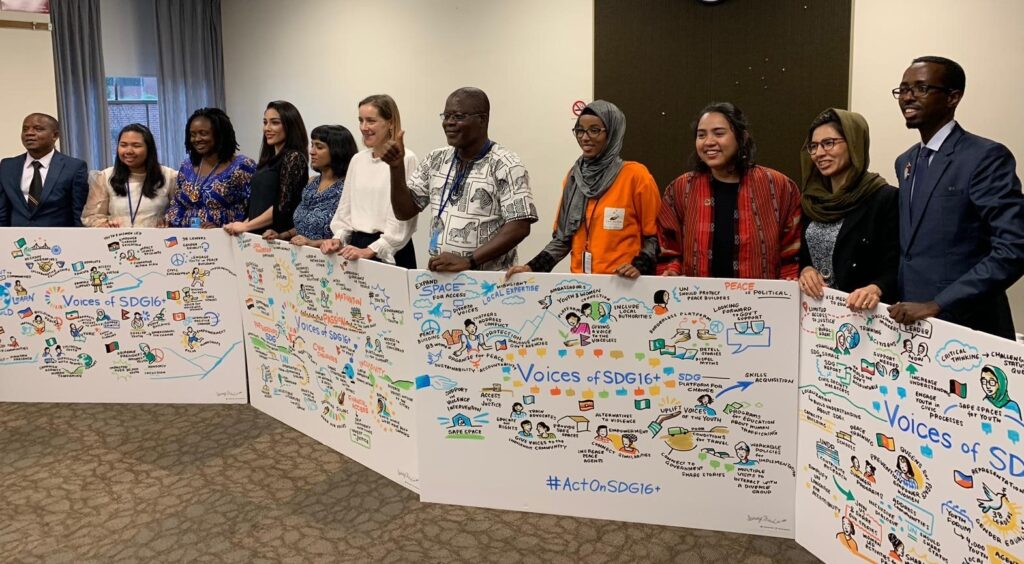
The preamble of the 2030 Agenda affirms that “the interlinkages and integrated nature of the Sustainable Development Goals are of crucial importance in ensuring that the purpose of the new Agenda is realized.” In other words, all 17 SDGs depend on one another, and no single goal can be realized fully alone.
Because the 2030 Agenda was designed to be integrative and universally applicable, the Goals are multidimensional, intertwining elements of the three main dimensions of the Agenda: society, the environment, and the economy. While most of the 17 Goals have a clear starting point in one of the three pillars, most Goals actually embed all three dimensions within their targets.
SDG interlinkages can “refer to those between goals, between a goal and relevant targets, or between targets.” For the purposes of this toolkit, interlinkages “include direct relations between two targets or indirect relations that connect two targets via a third target or more intermediate ones.” Analyzing interlinkages among the Goals and targets is critical for maximizing SDG integration and policy coherence.
As part of the integrated and indivisible nature of the SDGs, SDG16+ targets are closely interconnected, both with each other, as well as with all other SDGs. SDG 16+ is frequently referred to as an enabling Goal for the achievement of all other SDGs and for the 2030 Agenda broadly, highlighting that progress towards SDG16+ can have significant impacts on the implementation of other SDGs and targets. Consequently, the concept of interlinkages as they relate to SDG16+ hinges on the principle that “there can be no sustainable development without peace, and no peace without sustainable development.” Progress on targets for peace, justice and inclusion directly affects outcomes in other SDGs, while social, economic and environmental progress plays an equally important role in creating the conditions necessary for peace, justice and inclusion.
Furthermore, the implementation of the SDGs, across all contexts, is meant to be guided by a “human-rights based approach to development” founded on the principles of inclusivity, participation, rule of law, accountability and respect for human rights – all key elements of SDG 16+ that ensure the foundational objectives of “leaving no one behind” and “reaching the furthest behind first” are upheld. Ultimately, progress on peace, justice and inclusion targets affects outcomes in other SDGs, as well as the overall ability to achieve the 2030 Agenda. Without peace, justice and inclusion, none of the SDGs can be delivered in full.
From SDG 16 to SDG16+
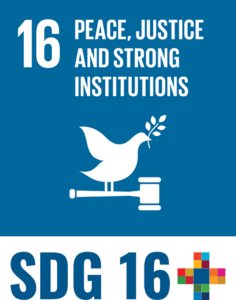
SDG 16 cannot be understood in isolation. It has strong links with all the other Goals. Of the SDG framework’s 169 targets, 36 directly measure an aspect of peace, inclusion, or access to justice. Only a third of these are found in SDG 16; the broader set of 36 can be understood as SDG16+ targets. Even beyond those, additional Goals and their targets indirectly hinge on aspects of peace, justice and inclusion. (See the SDG 16+ Target Guide in the Annex.)
In addition to the interlinkages between SDGs, the SDG16+ agenda has strong linkages with a large number of international agreements, including those that address international human rights and labor standards. Many of the SDG16+ targets are aligned with or directly support international human rights principles and obligations. Accordingly, international agreements are relevant both to understanding many of the SDG16+ targets, as well as to guiding overall SDG16+ implementation.
Thus, the plus (+) in SDG16+ refers to the interlinkages within the 2030 Agenda, as well as with other key international agreements and treaties.
National governments and specialized international agencies bear the responsibility for monitoring and collecting data for the official indicators designated for each SDG. However, supplementary data and non-official data from non-governmental sources, such as civil society organizations and academic institutions, play a key role in providing a more comprehensive understanding of progress on the SDGs.
Measuring progress for SDG16+ is particularly difficult given its political nature and overarching aims of reducing conflict, protecting human rights and improving governance “on all levels” – local, national and global. Consequently, the role of civil society in measuring SDG16+ is particularly important to complement official sources in collecting, monitoring and reporting on data for SDG 16. Non-official data can fill “methodological and conceptual data gaps,” while also reducing strain and bureaucratic delay from national statistical offices through strategic partnerships with official data collectors. CSOs are also more equipped to reach marginalized and vulnerable populations, particularly in fragile and conflict-affected contexts. Finally, civil society collected data is less likely to “face internal resistance” on politically sensitive issues. Non-official data from CSOs can take the form of civil society reports or spotlight reports (see chapter on spotlight reporting) and complementary indicators that provide a more comprehensive and nuanced picture of the state of SDG16+, in turn yielding more reflective and people-centered policies and approaches.
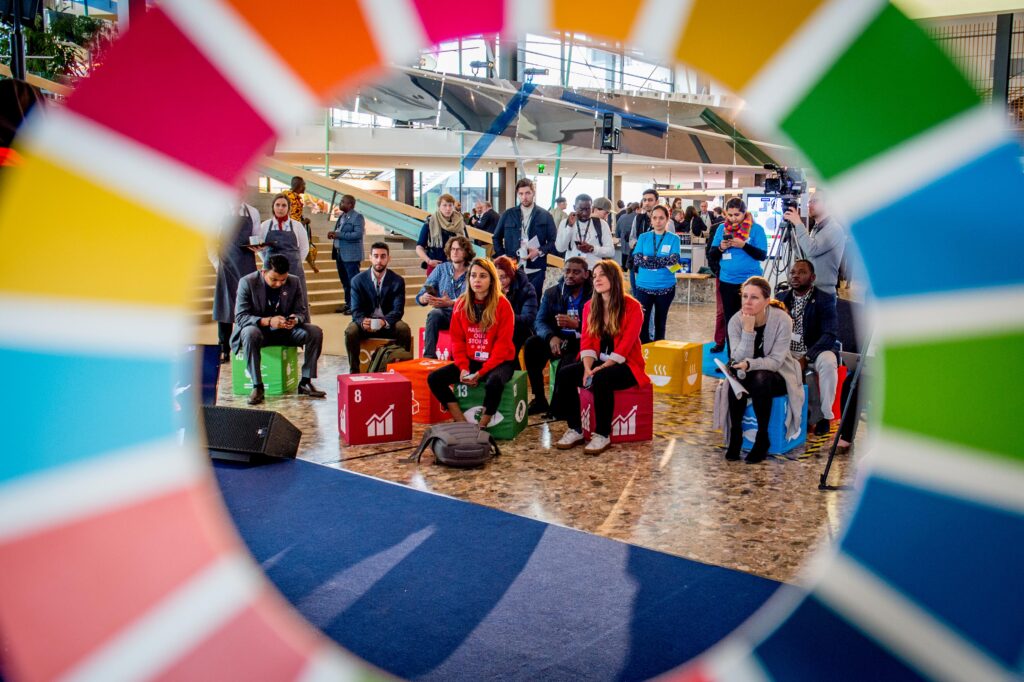
While some progress has been made towards more peaceful, just and inclusive societies since the start of the 2030 Agenda, overall global progress on the indicators of SDG 16 is uneven.18
Furthermore, according to the 2019 Sustainable Development Goals Report, “no substantial advances have been made toward ending violence, promoting the rule of law, strengthening institutions at all levels, or increasing access to justice.”19 Numerous challenges and structural barriers are hindering the realization of the SDG16+ framework,20with some of these challenges highlighted below.
First and foremost, in many countries, the lack of political will and concrete commitments to accelerate action on SDG 16 represents one of the primary barriers to implementing and monitoring the Goal.21 In some cases, governments are “continuing with business as usual, exploring how existing plans can be shown to achieve SDG targets rather than taking the SDG framework as a template for a more comprehensive and holistic approach to development.”22
Second, shrinking civic space across the globe is limiting many civil society actors from meaningfully engaging in SDG16+ implementation and accountability processes – both on- and off-line. Restrictive legal and regulatory frameworks for CSOs, barriers to freedom of assembly, association and expression, and inadequate access to financial and other resources are negatively affecting the realization of the SDGs, particularly SDG16+. 23 In extreme cases, human rights activists and defenders, journalists and others have been threatened, attacked or killed.24 These adverse conditions are limiting civil society and others from contributing to SDG16+ progress, as well as severely undermining the achievement of targets focused on non-violence, inclusion, participation, access to information and other fundamental freedoms.
Third, a lack of high-quality, accessible, timely and reliable disaggregated data to measure, monitor and assess progress on SDG16+ poses a significant challenge. Insufficient methodologies, lack of funding, weak statistical capacities of National Statistical Offices (NSOs) and a low priority for disaggregated data, all contribute to a dearth of data on SDG16+ targets, especially in countries affected by conflict or fragility.25 In addition, the politically sensitive nature of many SDG16+ targets may play a role in impeding the production and use of official data and statistics on matters related to peace, justice and inclusion.
Fourth, financial support for SDG16+ is severely lacking, leading to a gross underfunding and under-resourcing of its related work.26 Challenges include declining and poorly aligned ODA, decreased funding for justice, an increasing move to accredit military-security spending as a ‘progressive’ contribution to SDG16+, illicit financial flows and a significant loss of ODA to corruption.27 Failure to invest in SDG16+ is risking “worsening violence, injustice and exclusion, reversing development gains across all SDGs, including education, health and climate action.”28
Finally, the negative impact of the COVID-19 pandemic on SDG16+ progress has been immense. The pandemic’s disproportionate effects on the poorest and most vulnerable people and countries are undermining the SDGs, including SDG16+, deepening inequalities, increasing violence against women and children and potentially leading to increased social unrest and violence.29 It is also exacerbating the challenges identified above, directing political will and financial resources to the pandemic response and limiting stakeholder engagement and data collection, resulting in both justified and unjustified restrictions on civil society space.30
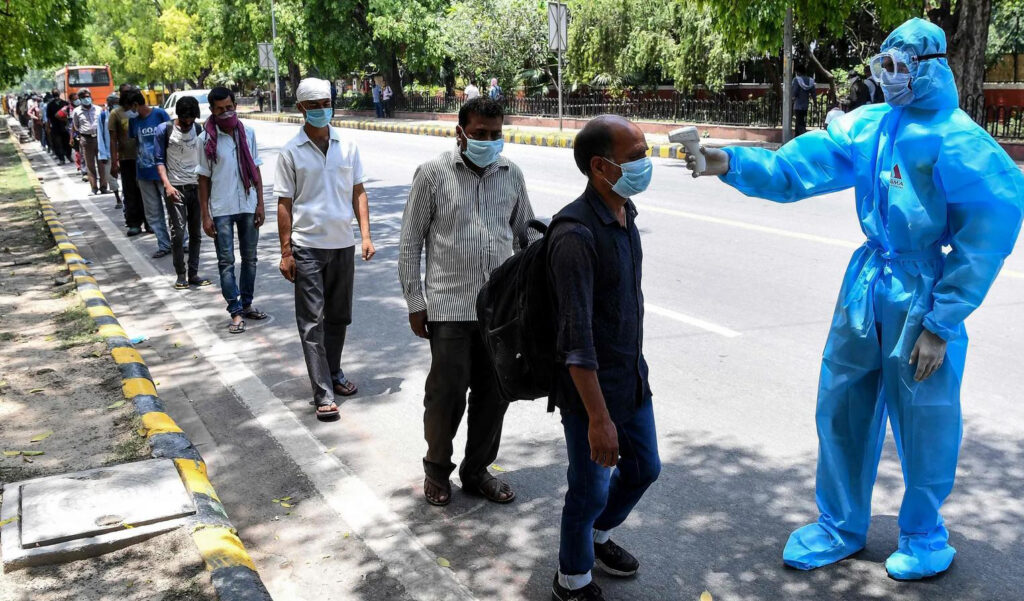
Looking back over the first five years of the 2030 Agenda, the world’s progress towards realizing the SDGs is not encouraging. As highlighted in the Rome Civil Society Declaration on SDG16+, adopted before the COVID-19 pandemic, the international community already found itself well behind on achievement of the 2030 Agenda – with SDG 16 progress in particular stagnating or even backsliding on many fronts and in many countries around the world. Since then, with less than a decade until 2030 and the emergence of a global health crisis, we have witnessed an exponential downward trend around the implementation of the SDGs, as key actors shift their focus to pandemic response and recovery.

The 2019 Rome Civil Society Declaration & the 2021 Rome Declaration
The Rome Declaration, titled “Amplified Commitments and Partnerships for Accelerated Action: Rome Civil Society Declaration on SDG16+,” outlines key messages, recommendations, and a broad call to action around SDG16+. The Declaration aimed to mobilize accelerated action on SDG 16 at the 2019 HLPF and SDG Summit.
The Rome Declaration is the product of an online and in-person consultation promoted among the TAP Membership and other civil society networks. The Rome Declaration was adopted and presented by civil society in a statement to UN Member States, international organizations, and other SDG16+ stakeholders at the Rome SDG16+ Conference on 28 May 2019.
Since the adoption of the Rome Declaration over two years ago, the main issues that it brought to the fore have remained valid, while the same structural injustices and inequalities that impacted the lives of vulnerable people before the COVID-19 crisis now determine who suffers most from it.
This 2021 Addendum to the original Rome Declaration, or the Rome Declaration 2.0, therefore serves as a firm and urgent reminder for the global community that peaceful, just and inclusive societies are at the core of not only sustainable development, but also sustainable recovery, especially at a time like this. In the midst of a protracted global crisis, the Rome Declaration 2.0, presented at the 2021 HLPF, is a renewed call for accelerated action on SDG 16 and the 2030 Agenda.
“The 2021 Rome Civil Society Declaration on SDG16+, titled “A Renewed Call for Strengthening Commitments, Partnerships, and Accelerated Action for SDG16+,” is an addendum to the original 2019 Rome Declaration and serves as a firm and urgent reminder for the global community that peaceful, just and inclusive societies are at the core of not only sustainable development, but also sustainable recovery, especially at a time like this.” In the midst of a protracted global crisis, the 2021 Rome Declaration, presented at the 2021 HLPF, is a renewed call for accelerated action on SDG16+ and the 2030 Agenda.
To read and endorse the Rome Civil Society Declaration on SDG16+ visit
“The world will not recover better from the COVID-19 pandemic unless we are able to empower individuals and ensure a ‘people-centered’ recovery. The Sustainable Development Goals offer a ready-made roadmap to recovery from COVID-19, already agreed to by 193 governments.”
– 2021 Rome Declaration
The COVID-19 pandemic has exposed deepening cracks in society, magnifying the deep inequalities that exist on many fronts while highlighting weaknesses in institutions that have been chronically under-funded and under-supported over past years or even decades. What has been clear since the onset of the pandemic is that in order to overcome the crisis and “build back better,” we must frame our response and recovery through the framework of SDG16+.
The pandemic has also underscored the critical accountability relationship between a State and its citizens, with government responsiveness to its citizens more important than ever before. It demonstrates the need to accelerate progress on SDG16+ around peaceful, just and inclusive societies, and highlights that progress towards SDG16+ is indeed a prerequisite to advancing against this global pandemic in communities around the world.
During the first-ever virtual HLPF, which convened in July 2020, the SDG16+ Global Community released a joint call to action calling on the urgent need to remain steadfast to realizing the commitments made in the 2030 Agenda and SDG 16 specifically. The Act Now on SDG16+ statement calls on governments, the international community and leaders to “urgently make SDG16+ the foundation for reset and recovery efforts, and for building more resilient societies and institutions going forward.”
“Without reduced inequality, violence, injustice and corruption, it will be impossible to make the necessary progress on global agendas such as education, health, gender equality, and climate change. The pandemic may push 60 million people into extreme poverty this year, setting in motion massive unemployment, a global economic crisis, and deepening inequality even further…It is now more clear than ever how crucially important national and local action for peace, justice and inclusion are for our common future. Even as the SDG16+ targets were being negotiated, we knew that their implementation would be demanding and critical to unlocking the 2030 Agenda as a whole.”
— “Act Now on SDG16+” statement released by the SDG16+ Community (July 2020)
Strong, transparent and accountable governments, a key element to SDG16+, pave the way for a more effective public health response “rooted in trust and social cohesion.” Trust in public institutions also allows for a fair allocation of key resources and crisis relief to the most vulnerable – paramount for an effective response to the pandemic. Fragile states plagued by pervasive conflict, violence, poverty, inequality and poor public services are extremely vulnerable to the widespread and compounding repercussions of the COVID-19 pandemic.
The degree to which governments and public institutions are accountable to their populations, providing an inclusive response undergirded by the commitment of “justice for all,” will determine the outcomes of this crisis. Historical precedent and current events have demonstrated the potential for crises to be exploited for political gain and the suppression of opposition. The propensity for exploitative, anti-democratic forces to take advantage of crises further underscores the need for accountable, inclusive and transparent institutions. Consequently, we must be vigilant to “defend and strengthen our institutions” by realizing the targets of SDG16+.
While many citizens have found themselves frustrated with their government’s weak response throughout this crisis, at this turning point there is a critical need for transparency and comprehensive accountability for those in power. Ultimately, leveraging SDG16+ is the key to ensuring an effective, inclusive, and just recovery and rebuilding.
While the challenges of the pandemic have permeated nearly every aspect of our lives, we are also confronted with an opportunity to build back better than before and create the future we want. As UN Secretary-General António Guterres stated, “We must act in solidarity and turn this crisis into an impetus to achieve the Sustainable Development Goals.”
Using SDG16+ as a road map, we can build more resilient societies that are better prepared to confront existential global challenges. Over a year after a worldwide public health crisis, we must double down on our commitment to SDG16+ and the 2030 Agenda, not only to salvage the Global Goals on the road to 2030 and ensure no one is left behind, but also to forge a more resilient and sustainable world for future generations.
The ‘Rome Declaration’ outlines key messages, recommendations and a call-to-action on SDG16+. Produced via online consultations, as well as deliberations during the Rome Conference Civil Society Day, it was adopted and presented by civil society to UN Member States, international organizations and other stakeholders at the Rome SDG16+ Conference in May 2019. Available in English, French, Spanish and Portuguese.
Available at: https://tapnetwork2030.org/romedeclaration/
A joint statement by the Global SDG16+ Community – a group of countries, civil society organizations, international organizations and global partnerships – calling for a response to the COVID-19 pandemic that is rooted in the SDG16+ framework. Launched during the 2020 HLPF, the statement is open for endorsements by organizations or governments.
Available at: https://www.sdg16hub.org/system/files/2020-07/statement_14Jul20.pdf
The 2030 Agenda for Sustainable Development, adopted by the UN General Assembly (UNGA) on 25 September 2015 by Resolution A/RES/70/1. Available in the six official UN languages.
Available at: https://sdgs.un.org/2030agenda
The website of UN DESA’s Division for Sustainable Development Goals (DSDG), which provides key information on sustainable development. There are links to SDG knowledge, the High-Level Political Forum on Sustainable Development (HLPF), intergovernmental processes, small island developing States (SIDS) and partnerships among others.
Available at: https://sdgs.un.org/
The Roadmap provides a shared vision for how to deliver the 2030 Agenda targets for peaceful, just and inclusive societies (SDG16+). It discusses the SDG16+ targets, transformative strategies, catalytic actions and enablers needed to build more peaceful, just and inclusive societies. Examples of the work of pathfinder countries and profiles of some SDG16+ partnerships and platforms are also provided. Available in English, French and Spanish.
Available at: https://www.sdg16.plus/roadmap
The Global Alliance’s contribution to the 2019 Thematic Review of SDG 16, this report provides an overview of country-level actions and progress on SDG16+ across different regions and development contexts and highlights key trends and findings on SDG16+ implementation globally. It is informed by a series of regional multi-stakeholder consultations on SDG16+ and 25 country case studies on SDG16+ (included in the report) and draws on evidence from recent research and analysis across SDG16+ targets.
Available at: https://www.un-globalalliance.org/sdg16-report
The website of the United Nations on the ‘Decade of Action’ with information on the UN Secretary-General’s call to all sectors of society to mobilize for a decade of action on three levels: global action, local action and people action.
Available at: https://www.un.org/sustainabledevelopment/decade-of-action/
The political declaration of the HLPF convened under the auspices of the UNGA in 2019 – the Sustainable Development Goals Summit – and subsequently adopted by the UNGA on 15 October 2019 in Resolution A/RES/74/4. The declaration calls for accelerated action to fulfill the 2030 Agenda and identifies ten specific commitments to do so. Available in the six official UN languages.
Available at: https://undocs.org/A/RES/74/4
Transparency, Accountability &
Participation (TAP) Network
Address: 205 E 42nd St.
New York, NY 10017
Email:
secretariat@tapnetwork2030.org